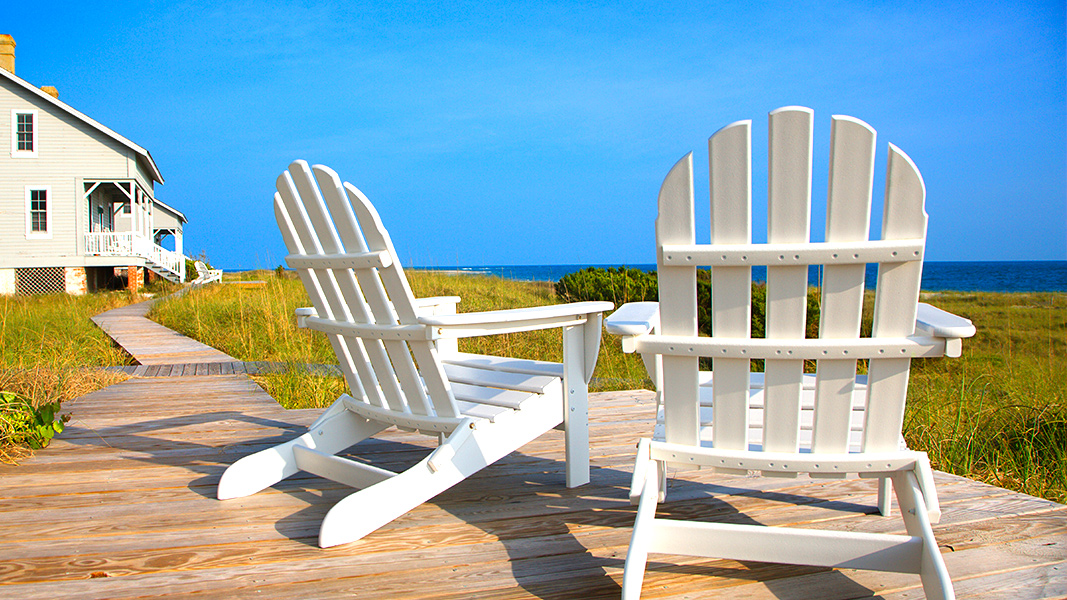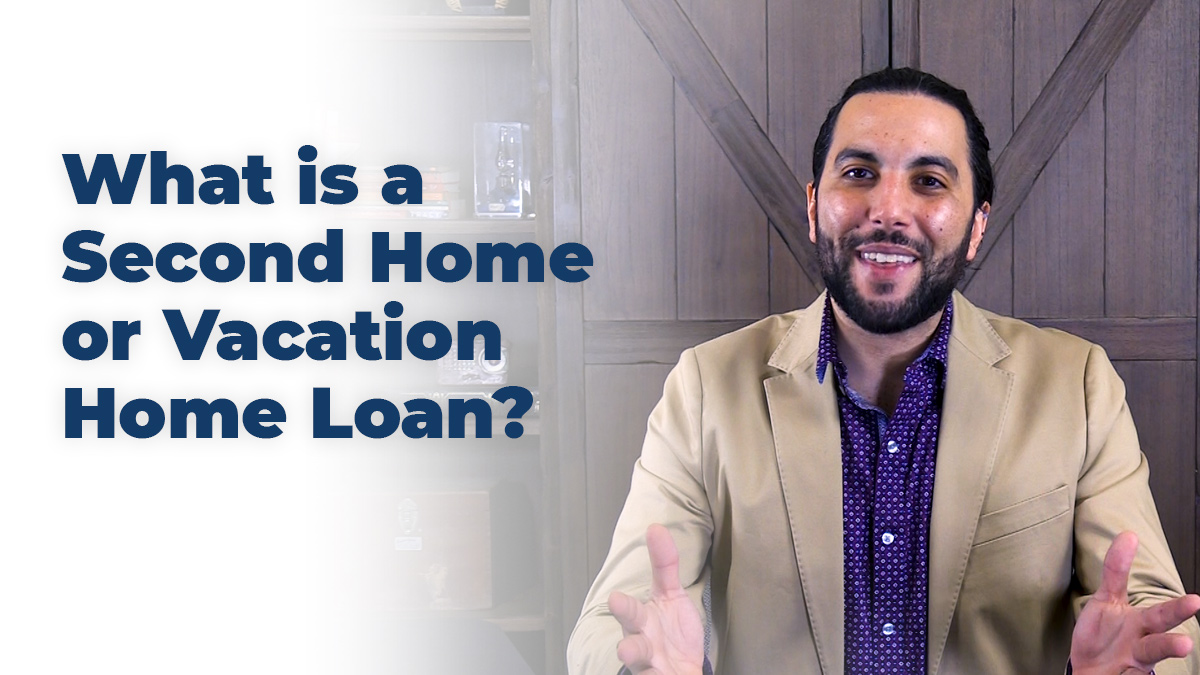In this article
Vacation properties offer a unique combination of financial benefits and the opportunity to create lasting memories. Financially, the property can be considered an investment. A vacation property often appreciates in value over time, potentially providing a source of long-term wealth. If you choose to rent the property when you’re not using it, it can generate rental income that helps cover ownership costs or even turn a profit.
On a personal level, having a second home allows you to escape to a familiar and beloved destination. It’s a place where you can relax, unwind, and recharge, away from the stresses of everyday life. It’s also a haven for quality family time, where you can create cherished moments with loved ones. While owning a second home or vacation property is not without its responsibilities, it can be a life-changing investment that offers the best of both worlds: financial potential and personal fulfillment.

Watch Now
What is a vacation mortgage?
One of the key advantages of this conventional program is the relatively low down payment requirement, which can be as low as 10% of the home’s purchase price. Additionally, borrowers with a credit score of 660 or higher can qualify for these loans, making them accessible to a broad range of homebuyers. Moreover, owning a vacation property often means becoming a part of a local community, providing a sense of belonging and opportunities for local engagement. While it comes with responsibilities, the financial and lifestyle benefits make owning a second home a fulfilling and well-rounded investment.
Why apply for a vacation mortgage?
Applying for a a mortgage for a vacation home is a common financial decision made by individuals who want to purchase a second home, typically for recreational purposes. There are several reasons why someone might choose to apply for a vacation mortgage:
Recreation and Relaxation: A vacation home allows you to have a dedicated space for leisure and relaxation. It can be a place where you escape from the hustle and bustle of daily life and enjoy a peaceful environment.
Investment: Some people purchase vacation homes as an investment. They may rent out the property when they’re not using it to generate rental income and potentially benefit from property appreciation.
Family Retreat: A vacation home can serve as a gathering place for extended family, allowing multiple generations to spend quality time together. It can be a special location for family vacations and create lasting memories.
Location and Lifestyle: If you have a favorite vacation destination, owning a vacation home in that area can provide easy and convenient access to the activities and lifestyle you enjoy.
Potential Tax Benefits: Depending on your individual circumstances and tax laws in your country, there may be tax advantages associated with owning a second home. Mortgage interest and property tax deductions are examples of potential tax benefits.
Diversification of Investments: Real estate can be a diversification strategy for your investment portfolio. Owning a vacation home can be a way to spread your investments across different asset classes.
Long-term Retirement Planning: Some people purchase vacation homes with the intention of eventually retiring there. They use it as a vacation home in the interim and then transition to it as their primary residence upon retirement.
Rental Income: If you’re not using the vacation home year-round, you can rent it out to generate income. This can help offset the costs of ownership and potentially turn the property into a profitable investment.
How to get a mortgage for a vacation home?
A vacation mortgage, also known as a second home mortgage, works similarly to a primary residence mortgage but with some key differences. Here’s how a vacation mortgage works:
Financing: You apply for a vacation home mortgage, just as you would for a primary residence. The lender evaluates your creditworthiness, income, and debt to determine whether you qualify for the loan. The mortgage terms and interest rates can vary based on your financial situation and the lender’s policies.
Down Payment: You may need to put down 10% to 20% or more of the purchase price, depending on your qualifications and your credit profile.
Interest Rates: Interest rates for vacation home mortgages are generally slightly higher than those for primary residence mortgages. This is because lenders view second homes as riskier investments.
Property Usage: The property is to be used primarily as a second home. This means you should not rent it out as a vacation rental or use it for income-generating purposes for a certain percentage of the year.
Location: The property should be located in an area that is suitable for use as a vacation home. It should be some distance away from your primary residence, and it’s not typically intended for daily commuting.
Insurance: You’ll need to secure homeowners’ insurance for the vacation property. Insurance requirements can be more complex for second homes, especially if you plan to rent it out, so it’s essential to discuss this with your insurance provider.
Property Taxes: You’ll be responsible for property taxes on the vacation home. These can vary widely by location and should be considered when budgeting for the property.
Rental Income: If you plan to rent out the vacation home, be aware that there may be restrictions on how often and for how long you can rent the property.
Who qualifies for a vacation mortgage?
Qualifying for a vacation mortgage, involves meeting specific criteria that determine eligibility:
Credit Score: A FICO credit score of 660 or higher is often considered a benchmark. A strong credit history demonstrates your ability to manage debt responsibly.
Income and Debt-to-Income Ratio: Your debt-to-income ratio should be below a certain threshold (typically around 43% but can vary). A lower ratio indicates your ability to comfortably handle additional debt.
Down Payment: You may need to put down 10% to 20% or more of the purchase price, depending on your qualifications and your credit profile.
Stable Employment: Demonstrating a stable employment history can boost your eligibility. Lenders prefer borrowers with a consistent income source.
Cash Reserves: Having sufficient cash reserves or liquid assets is beneficial. A requirement is you have several months’ worth of mortgage payments in savings to cover unexpected expenses.
Property Use: The intended use of the vacation home matters. It’s required that you use the property as a second home and not as a rental property. The property should be for your own use and enjoyment. If rented it can only be for a certain amount per time per year.
Location: The location of the vacation home matters, and restrictions based on the property’s distance from your primary residence exist. The property should be in a suitable vacation area and not within commuting distance of your primary residence.
Rental Income (if applicable): If you plan to rent out the vacation home, you may consider rental income when evaluating your ability to afford the mortgage. However, there may be restrictions on how often and for how long you can rent the property.
When considering a vacation mortgage, it’s important to review your finances, understand the associated costs, and work with a qualified mortgage lender to determine if you qualify for the loan. Additionally, you should consider the ongoing expenses of owning a second home, such as property taxes, maintenance, insurance, and any management fees if you plan to rent it out. Consulting with one of our mortgage advisors will help you make informed decisions about how the vacation mortgage can benefit you.

Are You Ready to Make a Move?
It's FREE and takes less than a minute to see what you could get.
